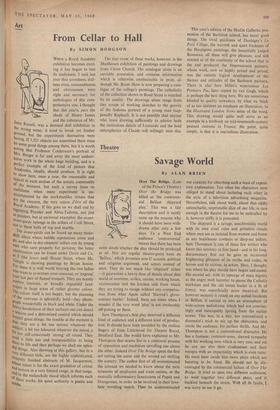Theatre
Savage World
By ALAN BRIEN Over The Bridge. (Late of the Prince's Theatre.) Over the Bridge was billed as 'the controver- sial Belfast shipyard play.' This was a fair description and it neatly sums up the reasons why it should have been with- drawn after only a few days. To a West End audience 'controversial' means that there has been some doubt whether the play should be produced at all. Nor are regular theatre-goers keen on 'Belfast,' which promises non-U accents, political and religious argument, and actors instead of stars. They do not much like 'shipyard' either —it guarantees a heavy dose of details about that world of overtime, strikes, unions, working hours, victimisation and the kitchen sink from which they are trying to escape without any compensa- tion from what Agate called 'Harrod's glove- counter banter.' Indeed, there are times when I wonder if the very word 'play' is not intolerably off-putting to them.
Sam Thompson's first play deserved a different kind of audience and a different kind of produc- tion. It should have been moulded by the restless fingers of Joan Littlewood for Theatre Royal, Stratford East. She would have explained to Mr. Thompson that drama lies in a continual process of opposition and resolution spiralling one above the other. Instead Over The Bridge spent the first act setting the scene and the second act shifting the scenery. The author first of all overestimated the amount we needed to know about the twin tyrannies of employers and trade unions, or the mutually inflammatory fanaticisms of Papist and Orangeman, in order to be involved in their love- hate wrestling match. Then he underestimated our capacity for absorbing such a mass of exposi- tory explanation. Too often his characters were obliged to stand about lecturing each other, in the style of a television advertising magazine. Nevertheless, talk about work, about that oddly untouchable, unprintable slice of our life, is rare enough in the theatre for me to be enthralled by it, however stiffly it is presented.
The shipyard is a savage, anachronistic world with its own cruel rules and primitive rituals where men are as isolated from women and home as any bunkhouse cowboys or deep-sea sailors. Sam Thompson is one of those few writers who know this territory at first hand—and in his long, documentary first act he gave us occasional frightening glimpses of its myths and codes, its heroes and its victims, in action. Here, I thought, was where his play should have begun and ended. His second act, with its upsurge of mass bigotry as the angry mob hammer to pieces the Catholic workman and the old union leader in a fit of frenzy, was superficially more theatrical. But however securely it rested on any actual incidents in Belfast, it carried us into an atmosphere of wide-screen melodrama which had not convinc- ingly and inescapably Sprung from the earlier scenes. This was, in a way, too conventional a dramatist's trick to stir up the characters, and excite the audience, for surface thrills. And Mr. Thompson is not a conventional dramatist. He has a humane, common-sense, shrewd sympathy with his working men which is very rare, and yet he can see also their crudenesses and their myopia with an impartiality which is even rarer. He must have inside him more plays which are bursting to .be freed. He should not be dis- couraged by the commercial failure of Over The Bridge. It tried to span two different audiences, to weld together two different plays, and it buckled beneath the strain. With all its faults, I was sorry to see it go.




































 Previous page
Previous page